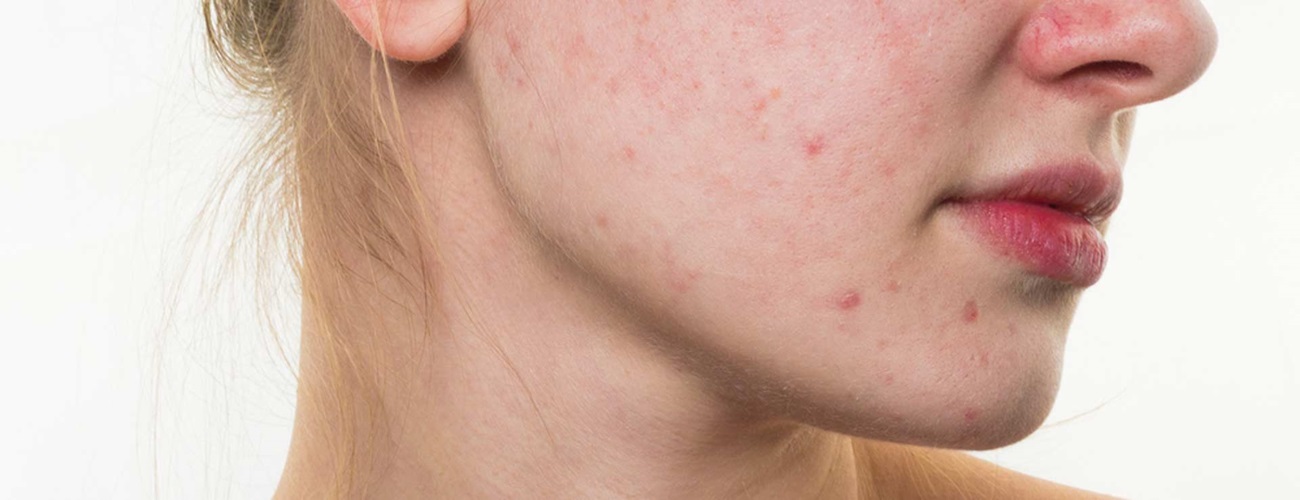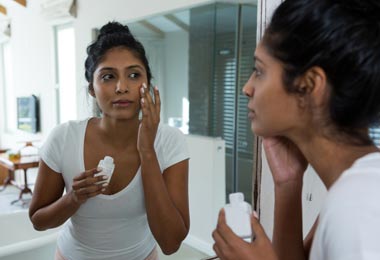Got Adult Acne? Get Answers from an Expert
If you’re like a lot of women, you thought all you had to do was get through puberty and you’d be rewarded with smooth, clear skin. So it’s a real blow when you’re way past braces and school dances but still find yourself battling your skin.
If this sounds like you, you’re not alone — acne isn’t strictly a teenaged plague. Adults can get it too, and women tend to have adult acne more than men, according to the American Academy of Dermatology.
Dermatologist Mary Sheu, M.D. , medical director of the Johns Hopkins Dermatology and Cosmetic Center at Green Spring Station, explains what causes adult acne and how to treat it.
Is adult acne different from the acne that bothered us as teenagers?
Adult acne is no different from the acne that we usually associate with our teen years. It can also occur in adulthood, and it’s extremely common. Typically, when we think of a pimple, people think of a raised, pink and inflamed bump, but that’s just one type. “Acne” is a broad term that includes pimples, blackheads, whiteheads, pustules and more severe acne, like nodulocystic acne.
What causes acne?
Especially for women, acne might be triggered by hormonal changes. As we get older, our estrogen levels often decline. At the same time, male hormones, like testosterone and dihydrotestosterone, which we all have, increase. Because our bodies have fewer female hormones to suppress the effects of the male hormones, the effects of those hormones become more evident. You may see an increase in oil production, and the oil produced by your face may be thicker. Your pores may look larger. This can lead to clogged pores and more acne.
Stress also plays a role. Stress can increase certain hormones, such as cortisol. This can lead to more inflammation, which can trigger and worsen acne.
How is acne treated?
Regular cleansing, twice a day, is ideal for removing those layers of old oil and makeup.
I often recommend a topical retinoid cream to unclog pores and exfoliate the skin. Retinoids also have some anti-inflammatory effects, and they increase the rate at which our skin cells divide. This helps to heal the skin faster. Many over-the-counter treatments contain retinoids.
Topical anti-inflammatories, like dapsone gel, can also reduce acne. An oral prescription medication called spironolactone can reduce the effects of male hormones. Chemical peels and blue light therapies also help if you want to clear up acne more quickly.
What should you look for in a cleanser?
In general, avoid overly aggressive and harsh cleansers, especially if you’re already using a prescription topical ingredient. With dry and sensitive skin, a creamy cleanser may be a better option. For oily skin, a gentle, foaming cleanser may be better. If someone has a lot of blackheads, something with salicylic acid can be helpful because it seeks out oil and unclogs pores. Benzoyl peroxide also has antibacterial properties and can help remove dead skin.
How can you modify your diet to improve acne?
Avoid excessive sugar, desserts and sodas.
In terms of healthful foods, leafy greens and a balanced diet with fruits and vegetables that contain vitamin C and beta-carotene can be helpful because these nutrients have an anti-inflammatory effect. Also, some studies have shown that the consumption of certain dairy products could be associated with acne.
When is it time to consider medication?
If your acne persists for more than a couple of months, if it’s causing scarring and if topical therapies haven’t been effective, it might be time to consider a systemic treatment, like an antibiotic, as a next step.




